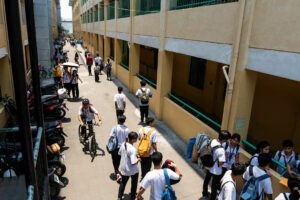
DepEd may go back to one-hour subjects to ease load
By Kyle Aristophere T. Atienza, Reporter
THE PHILIPPINES’ Department of Education (DepEd) plans to order schools nationwide to revert to the one-hour duration of subjects under a new curriculum to ease teachers’ workload, according to its chief.
DepEd took notice of teachers’ plight under the Matatag curriculum, which shortened the time for each subject to 45 minutes, Education Secretary Juan Edgardo “Sonny” M. Angara told a budget hearing at the House of Representatives on Monday.
He said they are close to finalizing an order that he would issue soon. “We are preparing a department order to inject flexibility, meaning we’ll go back to six one-hour subjects,” Mr. Angara said in mixed English and Filipino.
“Our thought process behind the Matatag curriculum is that the 45-minute lessons maximize learning time… for students,” he said. “We listened to the situation on the ground, and some teachers, as well as some schools, are struggling.”
Vice-President and ex-Education Secretary Sara Duterte-Carpio introduced in August 2023 the new curriculum, which seeks to streamline learners’ education by focusing on reading, literacy and numeracy in the first three schooling years of a student.
Party-list Rep. France L. Castro said the curriculum is “problematic” because teachers are forced to congest their teaching hours to 45 minutes per class to meet their teaching load.
“Our high school teachers have seven to eight [teaching] loads… so it’s really necessary to review this immediately,” she said in Filipino at the hearing.
An April 2024 DepEd order said teachers should spend six hours of their workday to classroom teaching, with the remaining two hours constrained to tasks such as curriculum planning and learners’ assessment.
Going back to the one-hour subject duration is a step in the right direction toward better education quality, Ferdinand Pol L. Martin, who teaches education at the University of the Philippines, said by telephone.
“Forty-five minutes is sometimes too short,” he said in Filipino. “Often, you have routines and ceremonies [before you start your teaching] and you run out of time, leaving you with just 30 minutes.”
“Other teachers go overtime as well, so there’s really nothing left for you. One hour is just right,” he added.
The Education department is also preparing for the 2025 Program for International Student Assessment (PISA) by strengthening science learning and improving computer literacy, Mr. Angara said.
The upcoming PISA survey is a “particular challenge” for the Philippine education system due to the lack of science teachers, made worse by the country’s poor performance in previous assessments.
“The President is particularly concerned about the next PISA exam,” he told congressmen.
“This is in March 2025 next year, just a few months from now, so we have formed a PISA technical working group within the department to organize test materials and [conduct] school infrastructure assessments,” he added.
Filipino students were among the world’s weakest in math, reading and science, according to the 2022 PISA. The Philippines ranked 77th out of 81 countries and performed worse than the global average in all categories.
DepEd is looking at digitizing its “PISA-focused science program” in online learning platform Khan Academy this month, according to the Education chief.
“From October to December, we will hold learning sessions for 1.6 million 15-year-old public school learners,” he said.
DepEd would keep holding “intensive learning sessions” until the day of the survey, he added.



